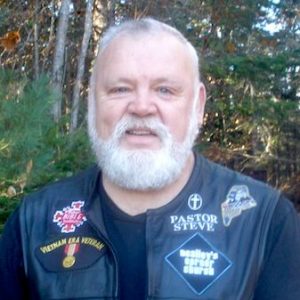Emma
By Pastor Steve Nute
 I strained to catch the clear tones of the soft voice as Emmanuel continued his interesting account of the nation’s struggle. I found myself wanting to know more, feel more, be more involved with these people who had been so used up.
I strained to catch the clear tones of the soft voice as Emmanuel continued his interesting account of the nation’s struggle. I found myself wanting to know more, feel more, be more involved with these people who had been so used up.
This session was the third in a series of talks we had with the “junior brother” of Ndife. His intellect, obviously high, spilled out in the conversation as well as his concern for his nation. I stayed behind on February 20th as Doc and Ephraim traveled to Enugu and, just as I was about to go bonkers, Emmanuel showed up for a cultural tour of his village.
Our first stop was a modern house under construction. This place was of particular interest because Emmanuel had drawn the plans for this during his university time. He was a student of engineering and was currently serving his government in a one year program required of all university graduates.
This house had sustained some cracks along a few walls and in one area of the poured concrete floor as well. Emmanuel showed me the reasons for and the correction of these flaws.
I guess that one thing that surprised me as we first came to Awka was the vast preponderance of concrete housing. The highly industrious Igbo had bee n using this material for quite some time and have many fine homes. They do not get a loan to build, rather just begin and finish as money comes along. Many such demi-structures dotted the landscape looking like strange tentacled creatures at rest with their reinforcing rods raised to heaven. I was interested to see the strength of Emmanuel’s design, reinforced in the floors with re-rod wires at 6×6 intervals. This cathedral ceilinged structure would satisfy the aesthetics of many an American home buyer.
We left the construction site and wound our way down a forest path which skirted the back side of the village. The first sight that we visited looked like some family’s deserted chicken house. I asked Emmanuel what it was and he replied, “It has to do with the ancient religion of the tribe.” This was my first look at a voodoo shrine which, although fallen down now, once was the seat of most of the religious activity in this village.
Emmanuel explained how all the “masquerade” costumes depicting the spirits of the dead ancestors were at one time kept in these shrines. A few years back some youths, hoping to restore tribal lore, had resurrected some of these and were surprised to find they were dealing with more than just artifacts. The evil, latent power of the old ways drew them in.
I looked toward the forest and Emma continued, “This forest was a sacred forest, here the bodies of twins were cast alive at birth.” He went on, “People thought that a twin was a curse, but the missionaries later convinced them that twins were a double blessing”
I found out, too, that any suicide victim was cast into this area and given no funeral rite because of the shame brought on the family.
We moved on down the path, joined a rutted road, and came to the family compound first owned by the Ndife family. It was currently the property of Emmanuel and Ephraim’s senior uncle.
Immediately upon passing the gate we saw a hut of concrete with two walls and a zinc roof. The front and rear of this hut were open with a 12 inch knee wall of sorts. This was the “man’s house”. Here the man of the compound would receive visitors. Here he would kill a chicken as sacrifice to departed spirits of his ancestors.
The area was ceilinged with wood, and I was told that the attic space contained artifacts and memoirs of past Ndife men. Each person had a carved stick of his life and some were specially marked to denote chieftainship. Against on wall, in front of a window area, rested the family “OFO” or staff of animistic authority. This particular spear like staff had been in the family for many generations. I observed the intricate design worked into the steel and began to understand why the statue at Awka’s entrance was a blacksmith. The holder of the “OFO” was bound by the spirits of departed Ndife’s to always speak truth and always deal justly in settling family matters. He believed that a curse or death would overtake him if he lied or perverted justice while being the “OFO” holder.
I said nothing, but my glance toward the feathers and blood on the staff and around it prompted Emma to explain, “Uncle still is a follower of the old ways. He has sacrificed so he can speak to our ancestors.” Outside and directly in front of the hut was a circle of trees which was the dwelling place for the “CHI” or soul of departed ones. This was explained as having something to do with fate or destiny. Here it is that senior uncle can come and speak directly with the souls of departed ancestors. Here it is that uncle does his sacrifice at festival time to feed his ancestors.
Emma explained how many have tried to splice two religions into one but have had little success with either. We walked by a small shrine where sacrifices were made to insure the birth of a male offspring, past the talking drum, used to signal in case of attack or important meetings, and up the main street to the blacksmith shop. The Igbo uses the blacksmith for a symbol, mainly because this is the area of craft for which they are known. This particular village is known for its smith in the surrounding areas.
The anvil, or “Osi si ama“, has come to mean “ruler of an area”. The chief of a town is called “Eze Ozoh“, or chief blacksmith. There are 3 levels of government in a village, starting with the family group. The next is a youth council, which deals with most matters in the village, only deferring to the highest group, the Elders. ”If you like, I will make an appointment for you with the chief of all the chiefs in Awka,” Emma offered. Larry and I jumped at the chance to learn from the greatest living expert on Igbo culture.
This man, a leader of leaders, retired from medical work and a tour with the World Health Organization. Returned to finish his days in his own village. He explained to us the religio-cultural base for the governmental system. ”There are four laws,” he stated, “which govern all we do.” The first is get food. The others follow in order: Protect yourself, evade overwhelming force, and have sex. All other laws stem from these. For example, if you are to have sex, there will be a fruit from that relationship. To fulfill this law, the chiefs of a village demand of a father, “Prove that you will care for this fruit.” From this comes a ceremony called marriage, two people fulfilling law number four in a responsible fashion.
I listened as this chief spoke of his trip to the U.S.S.R. and described a stop over in a major religious city. He had occasion to view the treasure trove of this group and stated, “They have the power to end all social problems if they choose.”
I pondered this statement and looked around at the splendor of the spacious house in which we were seated. I looked out the window at a mud structure not far away, and I was reminded that this major religion is not alone in hoarding what it has when so much need is around. Each of us must do our part, not look to others who may not be doing all we think they should.
Emma Ndife is a rare and warm person. I never heard him ask for a single thing from us, I never heard him complain about life in Nigeria. I did hear him offer workable ideas, ideals, and solutions to the difficulties ahead. Thank you, Emma, for being such a friend to us and for showing us an honest, open view of Nigeria.
